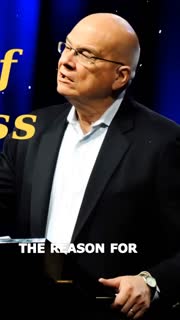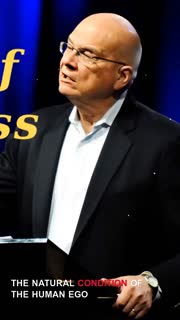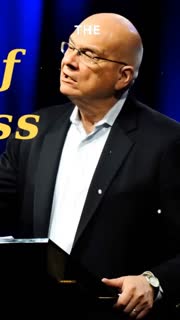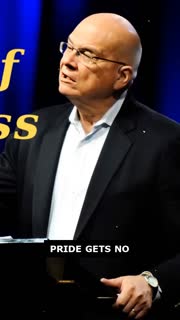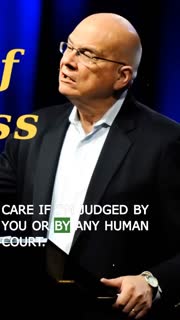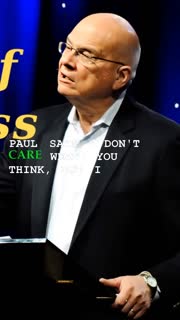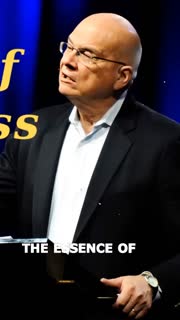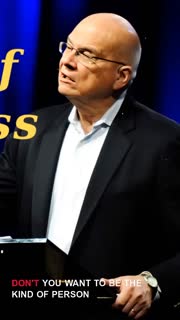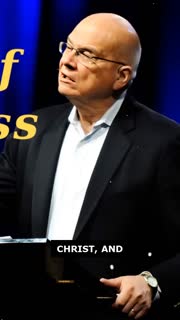Embracing Gospel Humility: Overcoming Pride and Division
Devotional
Sermon Summary
Bible Study Guide
Sermon Clips
1. "The reason for all the references to Paul and Apollos and Cephas was because this church had originally been planted by Paul, but then later on other ministers came through, other speakers, other evangelists came through, and there were different people that had connections. There were different connections to these different prominent ministers. So one person was mentored and discipled by Paul. Another one was mentored and appointed into leadership by Apollos, another great teacher, and so forth. And instead of everybody just being very happy that they had this relationship with Paul or Apollos, these relationships are now the basis for a power play. Parties have arisen. Divisions are tearing the church up." [02:28] (47 seconds)
2. "The natural condition of the human ego is to be empty, obviously. If it's empty, painful, busy, and fragile. Empty, painful, busy, and fragile. First, empty. The image, first of all, gives us, obviously, that the heart, at the center of the human ego, no matter how big it is, is an emptiness. Søren Kierkegaard, in his book, Sickness Unto Death, says, it is the normal state of the human heart to try to build its identity around something besides God. Spiritual pride is the illusion that you are competent to run your own life, achieve your own sense of self-worth, and find a purpose big enough to give you meaning in life without God." [09:53] (50 seconds)
3. "The ego has got something incredibly wrong with it. Your self, your identity, has something unbelievably wrong with it, because it's always drawing attention to itself, every single day. How you look, how you were treated. You know, people are always saying, my feelings were hurt. How can feelings be hurt? What do feelings taste like? It's your ego that's hurt. Your feelings are fine. You're having bad, bad, bad feelings about your ego. And you see, you know, just walking around doesn't hurt my toes unless there's something already wrong with them. And yet, you can't get through the day without feeling snubbed or feeling ignored or feeling stupid or getting down on yourself, or there's something wrong with your identity. There's something wrong with your ego. There's something wrong with your sense of self, because it's always, it's never happy. It's always drawing attention to itself." [11:48] (60 seconds)
4. "Pride gets no pleasure out of having something, only having more of it than the next person. You may think you're proud of being successful, or intelligent, or good-looking, but you really aren't. You're only proud of being more successful, more intelligent, and more good-looking than other people. And when you are in the presence of people who are much more successful, intelligent, and good-looking than you, you lose all pleasure in what you had. Because you really had no pleasure in it. You were proud of it. Pride is the pleasure of having more than the next person. Pride is the pleasure of being more than the next person." [14:11] (39 seconds)
5. "I care very little if I'm judged by you or by any human court. Now, the word judge is verdict. It's a word for verdict. It's a thing, by the way, you know, that Madonna's looking for. And what he does is he looks out and he says, one thing I want you to know is I don't care what you think. I don't care what you think about me. I don't care what anybody thinks about me. See, he doesn't just say, I care little if I'm judged by you or by any human body. He says, I have come to the place where my identity owes nothing to what people say. I don't care what you think. I don't care what anybody thinks. My identity, my self-regard is not tied in any way to your verdict and your evaluation of me." [20:18] (42 seconds)
6. "Paul says, I don't care what you think, but I don't care what I think. I have a very low opinion of your opinion of me, but I have a very low opinion of my opinion of me. Look carefully. Look what he says here. He says, I care very little if I'm judged by you or any human court. Indeed, I do not even judge myself. My conscience is clear, but that does not make me innocent. He will not fall into the trap of high self-esteem. He will not. He says, just because my conscience is clear, maybe my conscience is clear. That doesn't mean I'm innocent. Hitler might have had a clear conscience. That didn't mean he was innocent." [22:47] (36 seconds)
7. "The essence of gospel humility is not thinking more of yourself or thinking less of yourself, it's thinking of yourself less. It's not needing to think about yourself. It's not needing to connect things. Every conversation, I'm in this room with these people. Does that make me look good? Do I want to be here? I stop thinking about myself. The blessed rest of self-forgetfulness. ego that's not puffed up but filled up. You know how unique this is? Let me show you. Just to give you a couple of examples of this. This is not, in a way, is this high self-esteem? No. Is this low self-esteem? No. Certainly not. But it's not high self-esteem. It's, you stop the game. He just stops it. He doesn't think, he says, I don't care what you, I don't care about your opinion, but I don't care that much about my opinion. And that's the secret." [28:06] (54 seconds)
8. "Wouldn't you want to be the kind of person who when you go by a window or a mirror or something you don't look in, you don't admire what you see and you don't cringe either? Wouldn't you want to have some, wouldn't you want to be the kind of person who in your imaginary life you don't sit around fantasizing about hitting self-esteem home runs? Oh, if I could do that. Oh, if I could do that. Why don't you just suck yourself up? Do you ever sit around saying, boy, that was stupid, I was wrong. How could I have done something like that? Wouldn't you like to be free? Wouldn't you like, wouldn't you like to be the skater who wins the silver and yet just be as excited about those three triple jumps that the gold medal winner did? Just, you just love it just the way you love a sunrise. You just love the fact that it was done. You don't care if you did it, you're just as happy that she did it as if you did it, because you're just so happy to see it." [31:37] (63 seconds)
9. "What Madonna's looking for, what we're all looking for, is an ultimate verdict that we're important and that we're valuable. And every time we think we've done it, it doesn't seem to be there. And what that means is the world, every single day, we go to trial. We're in a courtroom every day. You notice how Paul says, I don't care what you think about me or what any human court thinks. Now, that is odd. They're not a court. The people he's writing to aren't a court. Why would he say, I don't care about what you think or any human court? He's talking, I think, metaphorically. And what he's trying to say is the problem with self-esteem, high or low, the problem with the way almost everybody's normal identity works is that every single day you're in the courtroom, you're on trial, and there's prosecution and there's defense. And everything you do, you're stamping evidence for the prosecution, evidence for the defense. And some days, you feel like you're winning the trial, and some days, you feel like you're losing a trial. And Paul says, I have found the secret. The trial's over for me. I'm out of the courtroom. It's gone. It's over. Because the ultimate verdict is in." [34:16] (70 seconds)
10. "In Jesus Christ, and only in the gospel of Jesus Christ, do you get the verdict before the performance. You see this? Whether you're an atheist, you say, well, I get my self-image from just being a very good person. Fine. What you mean is, if I'm a good person, if I'm a good person, if I'm a good person, eventually, I hope for some kind of verdict that I'm a good person. In other words, performance leads to the verdict. If you're a Buddhist, performance leads to the verdict. If you're a Muslim, performance leads to the verdict, which means every day you're in the courtroom, every day you're on trial. That's the problem. God says, in Christianity, the verdict leads to performance. The performance does not lead to the verdict. Christianity, when the minute I believe, God says, you are my beloved in whom I'm well pleased. The verdict is in. Now, Romans 8, chapter 1, chapter 8, verse 1, now there is no condemnation for those who are in Christ Jesus. The verdict is in. And now I perform on the basis of the verdict. He loves me. He accepts me. Now I don't have to do things just to build my resume. I don't have to do things to make me look good. I can do things to do things. I can help people to help people. Not so I can feel better about myself. Not so I can fill up the emptiness." [35:37] (73 seconds)
Ask a question about this sermon
2. "The natural condition of the human ego is to be empty, obviously. If it's empty, painful, busy, and fragile. Empty, painful, busy, and fragile. First, empty. The image, first of all, gives us, obviously, that the heart, at the center of the human ego, no matter how big it is, is an emptiness. Søren Kierkegaard, in his book, Sickness Unto Death, says, it is the normal state of the human heart to try to build its identity around something besides God. Spiritual pride is the illusion that you are competent to run your own life, achieve your own sense of self-worth, and find a purpose big enough to give you meaning in life without God." [09:53] (50 seconds)
3. "The ego has got something incredibly wrong with it. Your self, your identity, has something unbelievably wrong with it, because it's always drawing attention to itself, every single day. How you look, how you were treated. You know, people are always saying, my feelings were hurt. How can feelings be hurt? What do feelings taste like? It's your ego that's hurt. Your feelings are fine. You're having bad, bad, bad feelings about your ego. And you see, you know, just walking around doesn't hurt my toes unless there's something already wrong with them. And yet, you can't get through the day without feeling snubbed or feeling ignored or feeling stupid or getting down on yourself, or there's something wrong with your identity. There's something wrong with your ego. There's something wrong with your sense of self, because it's always, it's never happy. It's always drawing attention to itself." [11:48] (60 seconds)
4. "Pride gets no pleasure out of having something, only having more of it than the next person. You may think you're proud of being successful, or intelligent, or good-looking, but you really aren't. You're only proud of being more successful, more intelligent, and more good-looking than other people. And when you are in the presence of people who are much more successful, intelligent, and good-looking than you, you lose all pleasure in what you had. Because you really had no pleasure in it. You were proud of it. Pride is the pleasure of having more than the next person. Pride is the pleasure of being more than the next person." [14:11] (39 seconds)
5. "I care very little if I'm judged by you or by any human court. Now, the word judge is verdict. It's a word for verdict. It's a thing, by the way, you know, that Madonna's looking for. And what he does is he looks out and he says, one thing I want you to know is I don't care what you think. I don't care what you think about me. I don't care what anybody thinks about me. See, he doesn't just say, I care little if I'm judged by you or by any human body. He says, I have come to the place where my identity owes nothing to what people say. I don't care what you think. I don't care what anybody thinks. My identity, my self-regard is not tied in any way to your verdict and your evaluation of me." [20:18] (42 seconds)
6. "Paul says, I don't care what you think, but I don't care what I think. I have a very low opinion of your opinion of me, but I have a very low opinion of my opinion of me. Look carefully. Look what he says here. He says, I care very little if I'm judged by you or any human court. Indeed, I do not even judge myself. My conscience is clear, but that does not make me innocent. He will not fall into the trap of high self-esteem. He will not. He says, just because my conscience is clear, maybe my conscience is clear. That doesn't mean I'm innocent. Hitler might have had a clear conscience. That didn't mean he was innocent." [22:47] (36 seconds)
7. "The essence of gospel humility is not thinking more of yourself or thinking less of yourself, it's thinking of yourself less. It's not needing to think about yourself. It's not needing to connect things. Every conversation, I'm in this room with these people. Does that make me look good? Do I want to be here? I stop thinking about myself. The blessed rest of self-forgetfulness. ego that's not puffed up but filled up. You know how unique this is? Let me show you. Just to give you a couple of examples of this. This is not, in a way, is this high self-esteem? No. Is this low self-esteem? No. Certainly not. But it's not high self-esteem. It's, you stop the game. He just stops it. He doesn't think, he says, I don't care what you, I don't care about your opinion, but I don't care that much about my opinion. And that's the secret." [28:06] (54 seconds)
8. "Wouldn't you want to be the kind of person who when you go by a window or a mirror or something you don't look in, you don't admire what you see and you don't cringe either? Wouldn't you want to have some, wouldn't you want to be the kind of person who in your imaginary life you don't sit around fantasizing about hitting self-esteem home runs? Oh, if I could do that. Oh, if I could do that. Why don't you just suck yourself up? Do you ever sit around saying, boy, that was stupid, I was wrong. How could I have done something like that? Wouldn't you like to be free? Wouldn't you like, wouldn't you like to be the skater who wins the silver and yet just be as excited about those three triple jumps that the gold medal winner did? Just, you just love it just the way you love a sunrise. You just love the fact that it was done. You don't care if you did it, you're just as happy that she did it as if you did it, because you're just so happy to see it." [31:37] (63 seconds)
9. "What Madonna's looking for, what we're all looking for, is an ultimate verdict that we're important and that we're valuable. And every time we think we've done it, it doesn't seem to be there. And what that means is the world, every single day, we go to trial. We're in a courtroom every day. You notice how Paul says, I don't care what you think about me or what any human court thinks. Now, that is odd. They're not a court. The people he's writing to aren't a court. Why would he say, I don't care about what you think or any human court? He's talking, I think, metaphorically. And what he's trying to say is the problem with self-esteem, high or low, the problem with the way almost everybody's normal identity works is that every single day you're in the courtroom, you're on trial, and there's prosecution and there's defense. And everything you do, you're stamping evidence for the prosecution, evidence for the defense. And some days, you feel like you're winning the trial, and some days, you feel like you're losing a trial. And Paul says, I have found the secret. The trial's over for me. I'm out of the courtroom. It's gone. It's over. Because the ultimate verdict is in." [34:16] (70 seconds)
10. "In Jesus Christ, and only in the gospel of Jesus Christ, do you get the verdict before the performance. You see this? Whether you're an atheist, you say, well, I get my self-image from just being a very good person. Fine. What you mean is, if I'm a good person, if I'm a good person, if I'm a good person, eventually, I hope for some kind of verdict that I'm a good person. In other words, performance leads to the verdict. If you're a Buddhist, performance leads to the verdict. If you're a Muslim, performance leads to the verdict, which means every day you're in the courtroom, every day you're on trial. That's the problem. God says, in Christianity, the verdict leads to performance. The performance does not lead to the verdict. Christianity, when the minute I believe, God says, you are my beloved in whom I'm well pleased. The verdict is in. Now, Romans 8, chapter 1, chapter 8, verse 1, now there is no condemnation for those who are in Christ Jesus. The verdict is in. And now I perform on the basis of the verdict. He loves me. He accepts me. Now I don't have to do things just to build my resume. I don't have to do things to make me look good. I can do things to do things. I can help people to help people. Not so I can feel better about myself. Not so I can fill up the emptiness." [35:37] (73 seconds)
